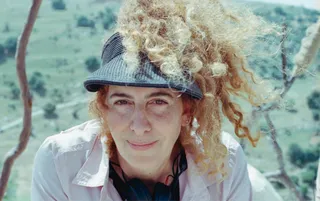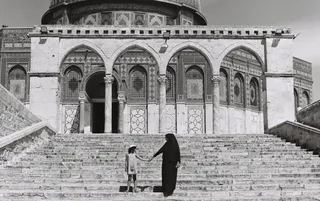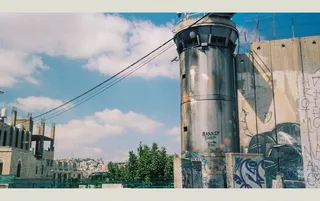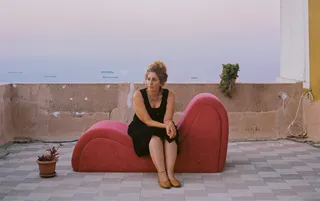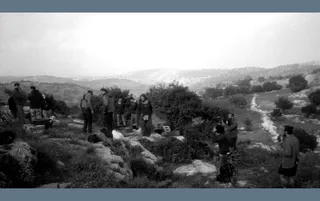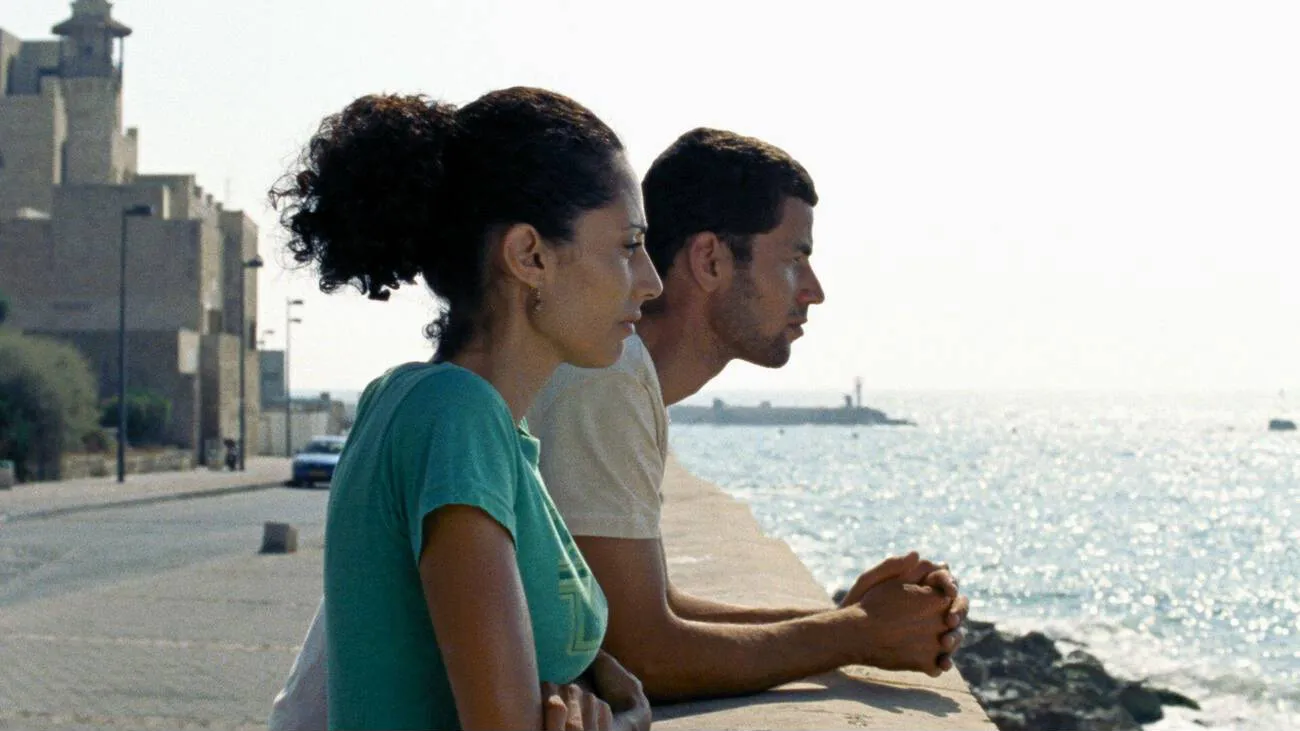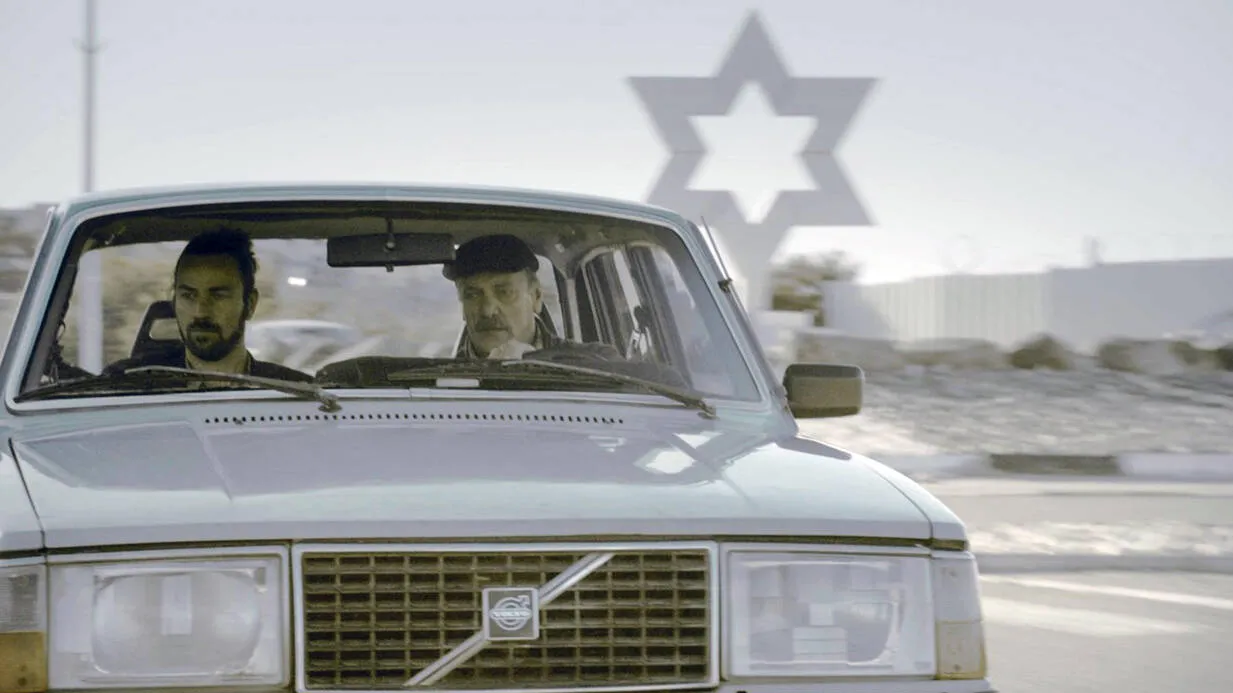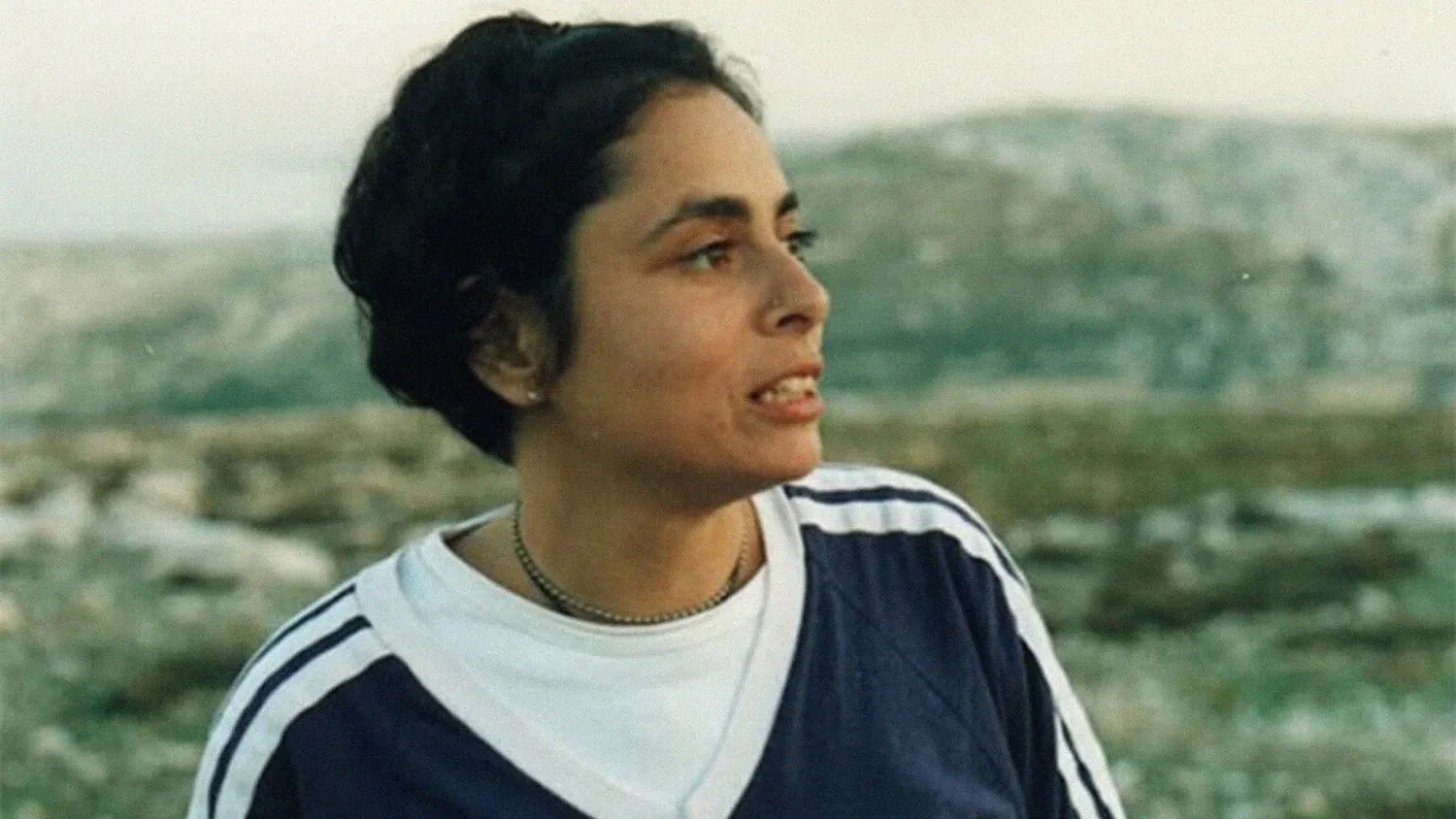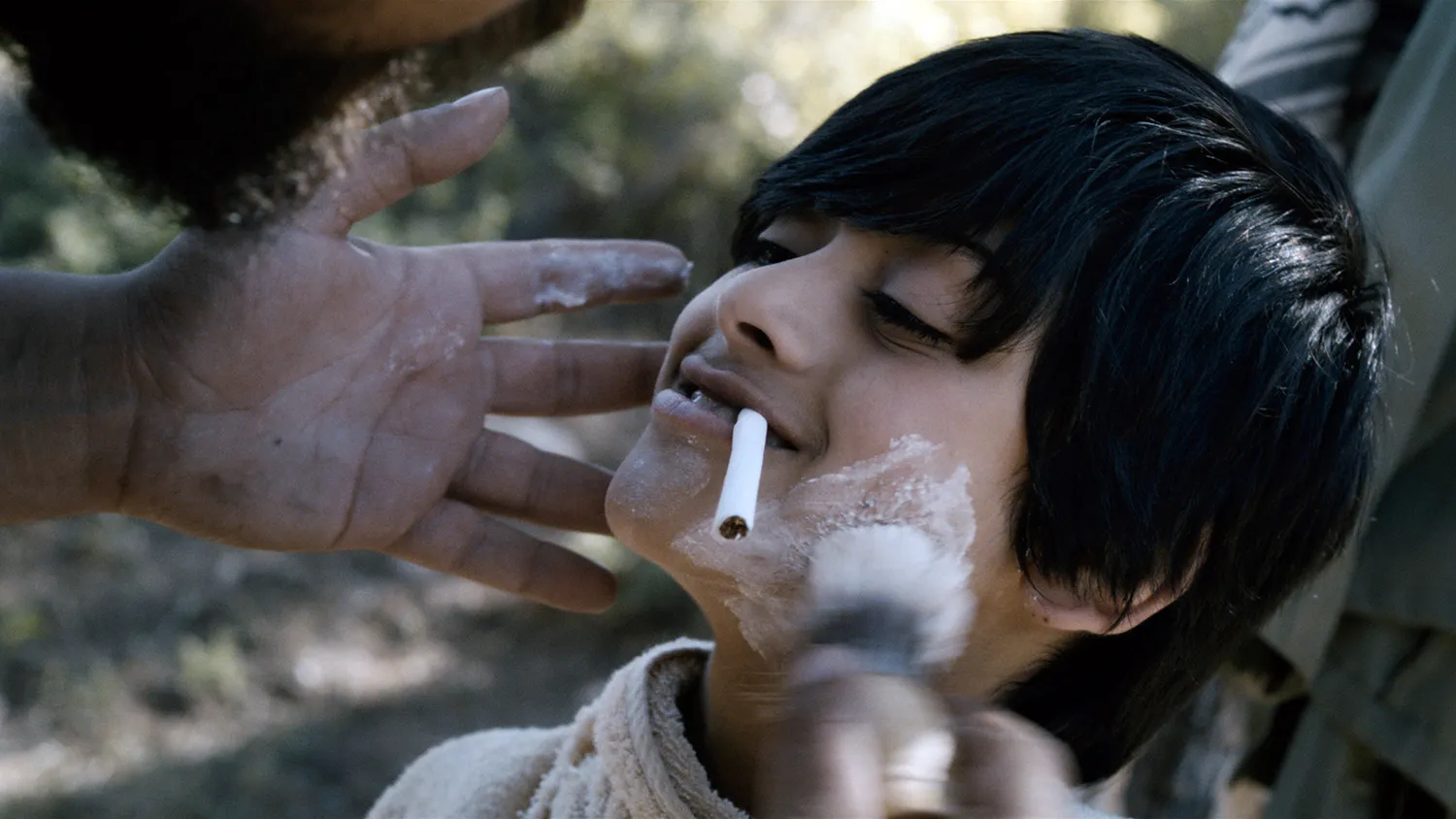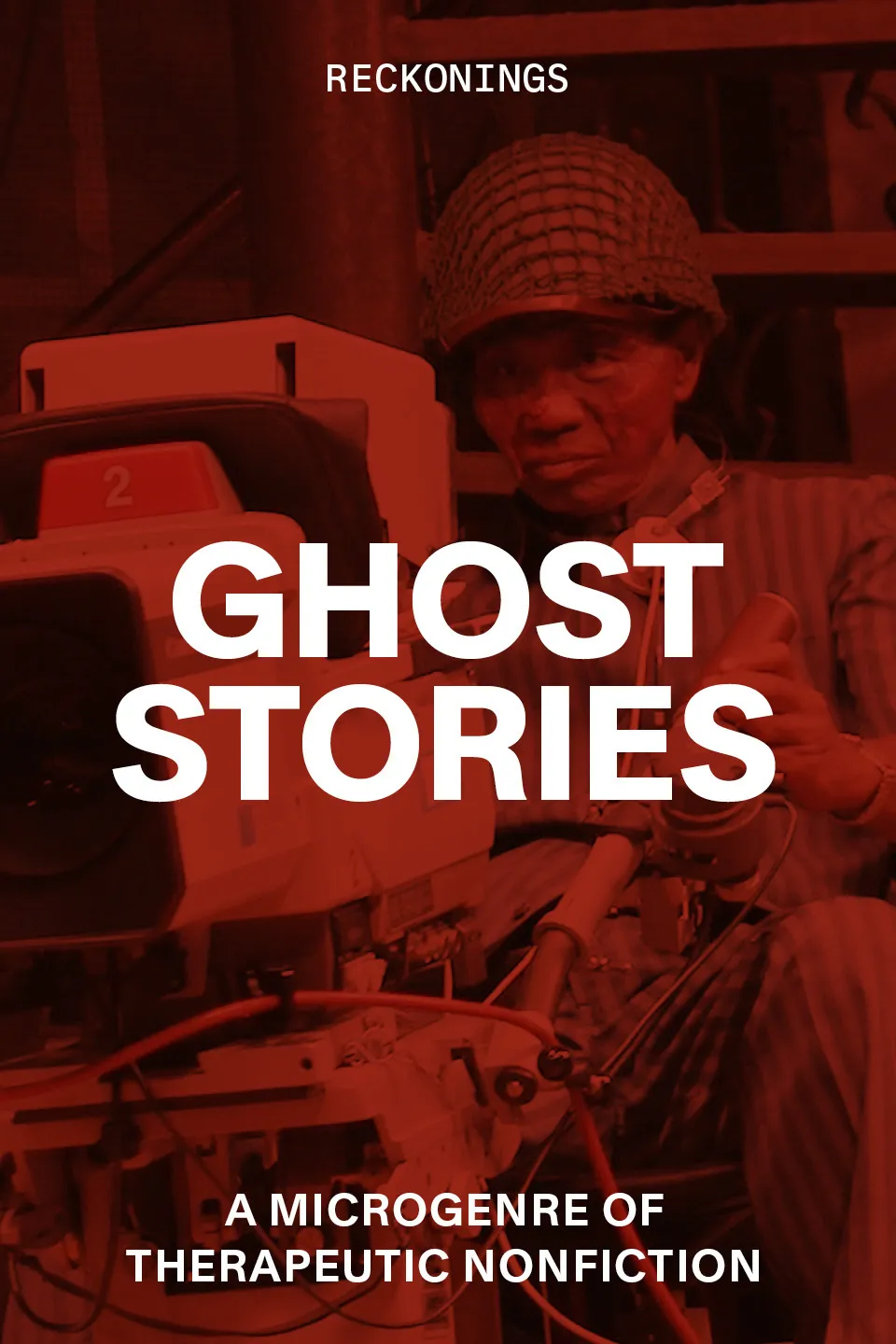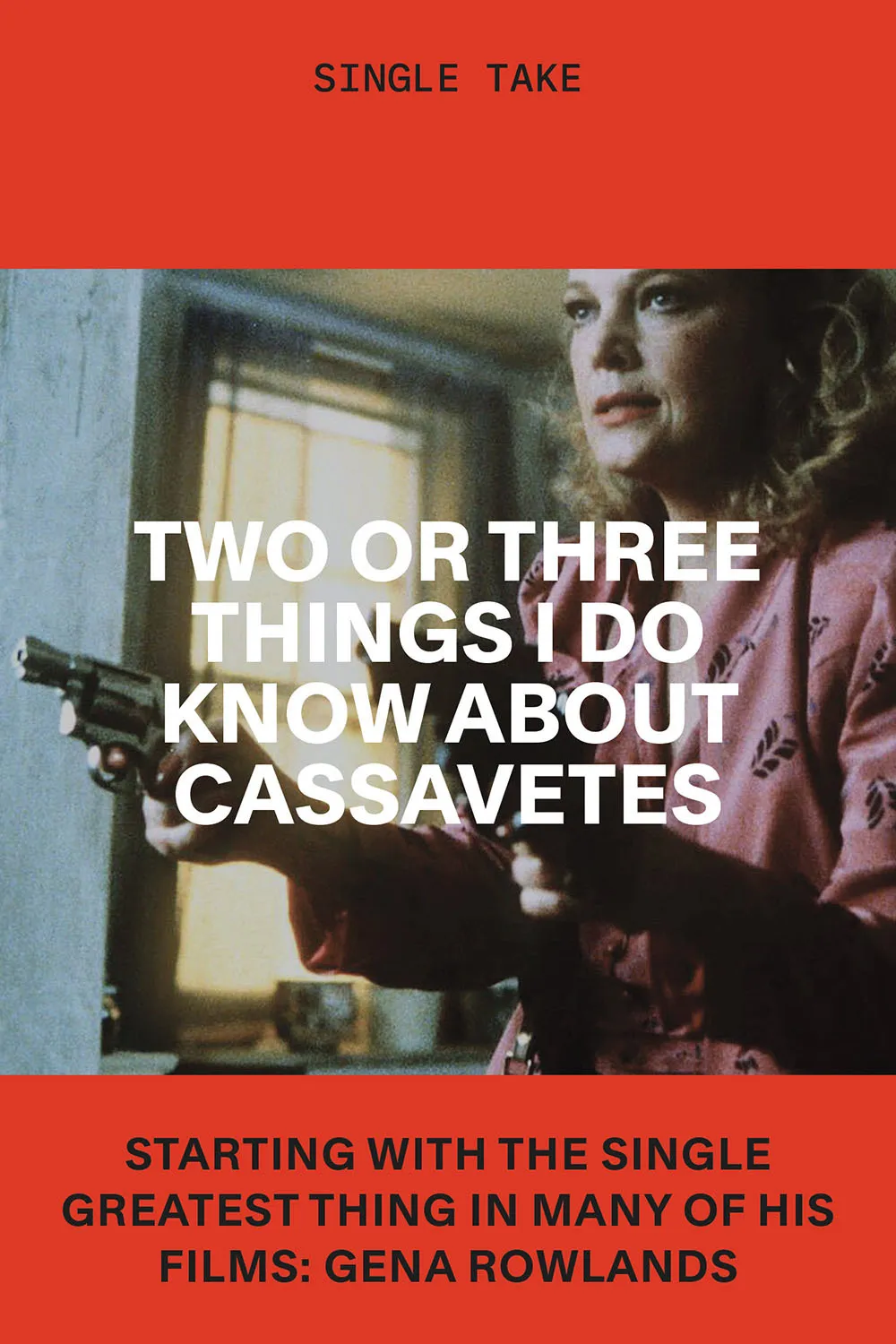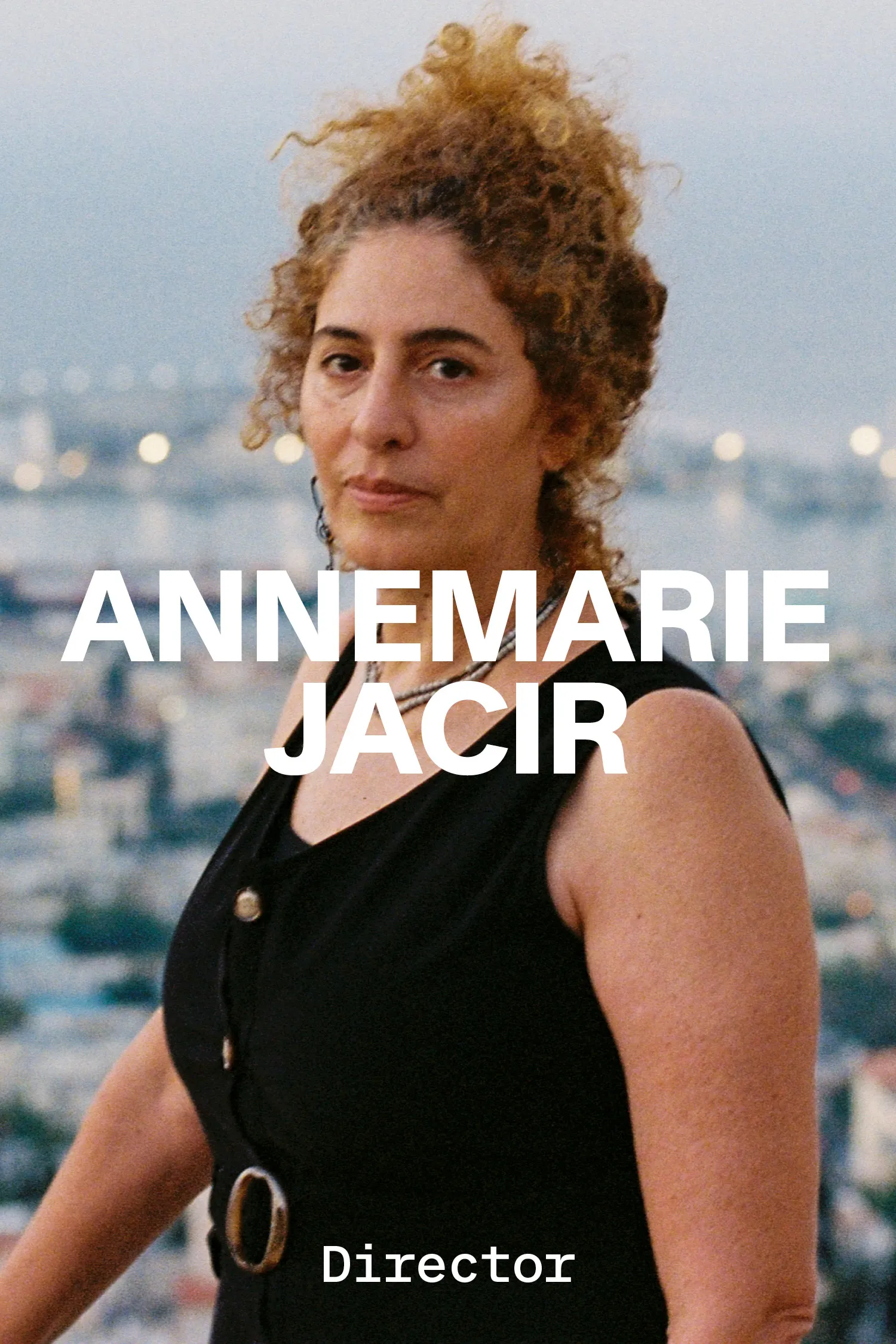Strong Roots
By Kaleem Aftab
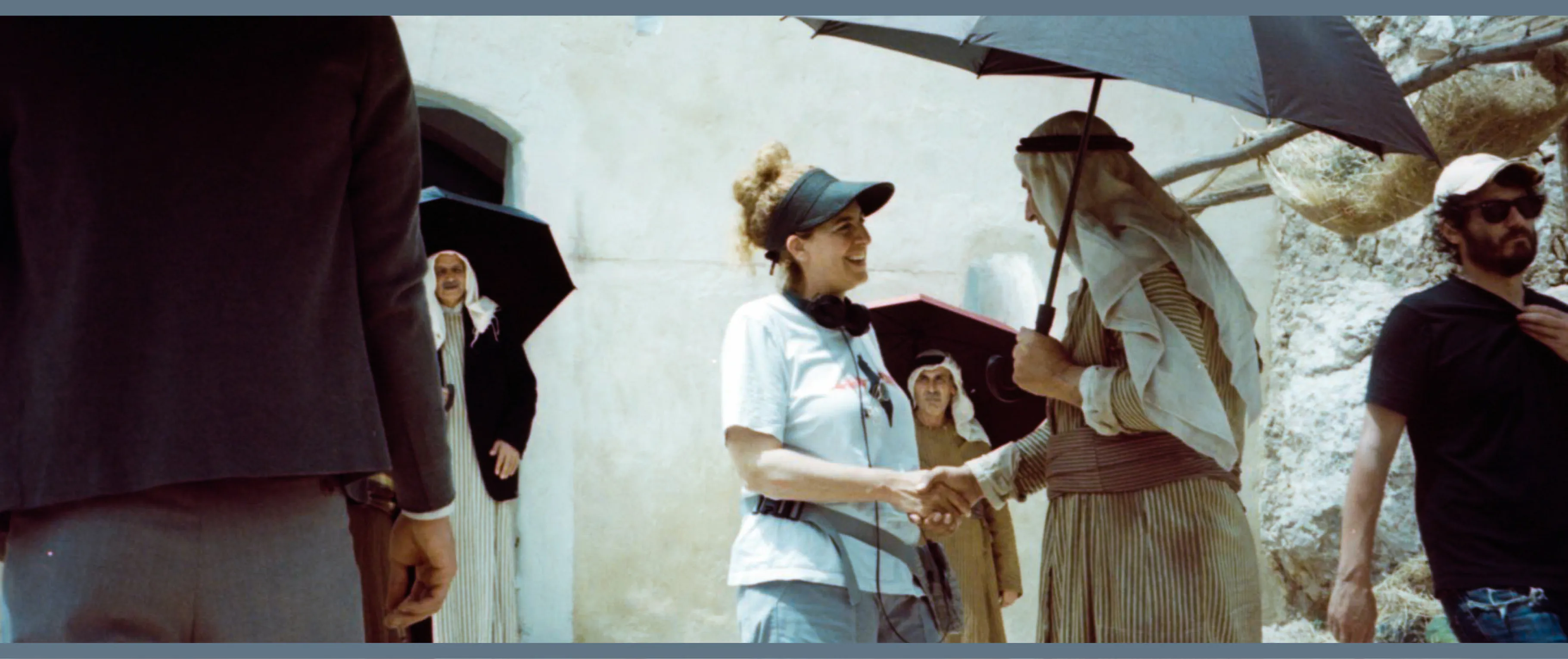
Annemarie Jacir with actors on the set of Palestine 36 in Jordan, April 2024
strong roots
Kaleem Aftab
Filmmaker Annemarie Jacir channels her Palestinian heritage in her poetic and political cinema
March 7, 2025
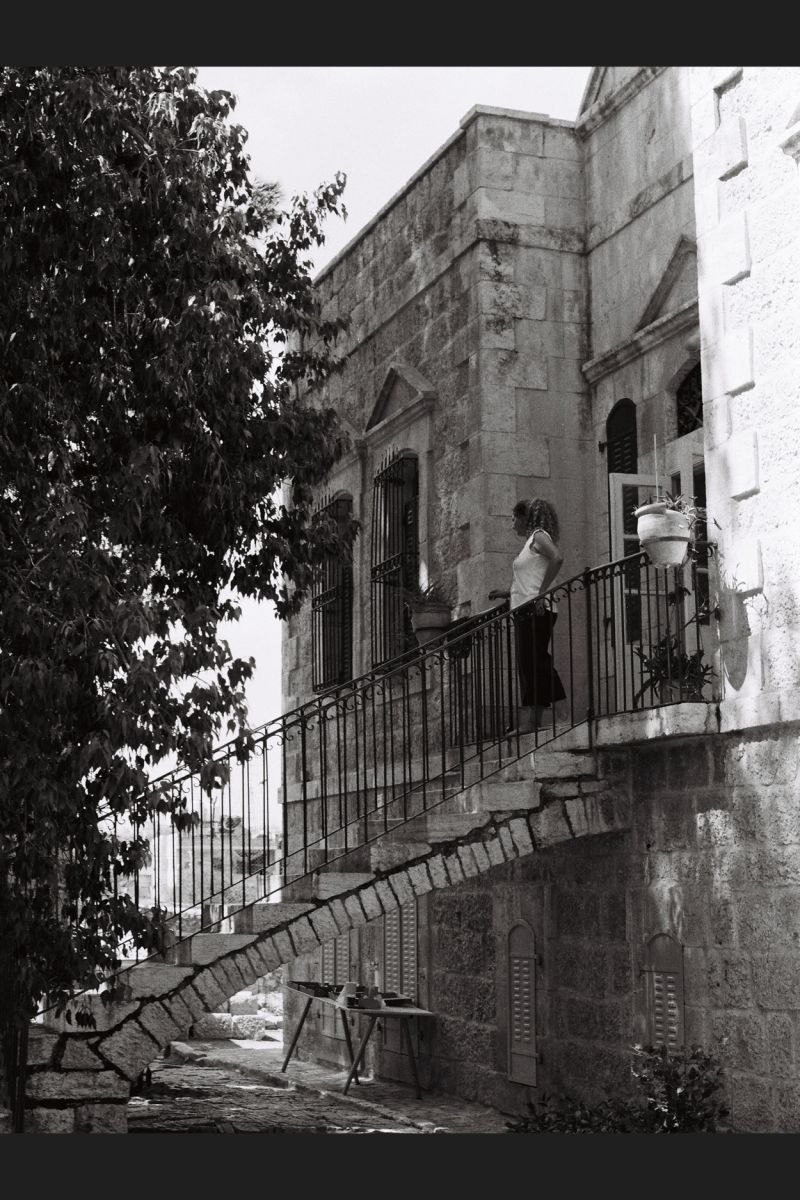
Annemarie outside her former family home, now the Dar Yusuf Nasri Jacir for Art and Research in Bethlehem, Palestine
Annemarie Jacir didn’t go to the cinema until her late teens. The daughter of Palestinians who fled their homeland following the Six-Day War in 1967, Jacir was raised in Riyadh during the late 1970s and ’80s at a time when cinemas were banned in Saudi Arabia. It was only when she attended high school in Texas that she first went to a movie theater and spent time in an edit room, where she began playing with images. From there, she ventured to California to study political science and literature, ultimately adapting her love of poetry to cinematic pursuits. It wouldn’t be too far-fetched to say that she is now the epitome of a visual poet. Her work builds off her heritage to pose questions of identity and home, the absence of which is often the source of conflict and resentment—or, conversely, of romance and love. Jacir attended film school at Columbia University and her graduate short, Like Twenty Impossibles (2003), became the first short film to be in the official selection of the Cannes Film Festival and the first work by a Palestinian woman. Her subsequent three features—Salt of This Sea (2008), When I Saw You (2012) and the exquisite Wajib (2017)—have established her as a festival darling and one of the preeminent filmmakers of the Arab world.
I first met Annemarie at the Cannes Film Festival in 2012. We became fast friends, and since then I’ve witnessed her creative and personal evolution: her struggle to get films made, the publication of her poetry, her marriage to Ossama Bawardi (who is also her partner at their production company, Philistine Films) and the birth of their young daughter. The family founded a community artist space in Bethlehem, now run by her sister, that incubates new generations of talent. Her artistic work has also led to personal hardships—for a time she was banned from entering Palestine, living in Amman before being able to return. Jacir is currently in postproduction on Palestine 36, which follows the story of a farmer-led uprising against British rule, but she made space to discuss her journey into filmmaking, across America and via characters who are always searching for a place to call home.
From left: Annemarie Jacir on the set of Palestine 36; Annemarie and her daughter at the Al-Aqsa Mosque in Jerusalem
Annemarie, let’s start by talking about your background. How did you get into filmmaking, and what were your influences?
My background in cinema culture was almost nonexistent growing up. I was raised in Saudi Arabia, where at the time there were no cinemas and no real exposure to film. I lived there until I was 15. My family wasn’t involved in cinema, but they were very creative. My mother, who was an Arabic teacher, would paint murals on the walls of our home and create all sorts of artistic projects. My father was an accountant—definitely not an artistic background, but he was always politically engaged and had a love of culture. I have one brother and one sister, so it wasn’t a huge family, but we were very close. My siblings and I had to entertain ourselves, so we wrote and performed plays for any guests that were “lucky” enough to visit, and held art exhibits. There was nothing else to do, so creativity became our survival mechanism.
Reading was also a huge part of my upbringing. My whole family read endlessly. That’s where my love for storytelling started. Coming from a family of writers, I was drawn to writing, especially poetry, from a young age. Looking back, I see how connected poetry and cinema are: Both rely on minimalism to evoke deep emotions. But I never thought about filmmaking until much later.
Did you feel a sense of belonging in Saudi Arabia, or did you feel like an outsider?
I felt like an outsider. We weren’t Saudi, and all non-Saudis were grouped together in an international school. That school was a mix of cultures—American, Swedish, Pakistani, Lebanese, Ghanaian—you name it. So in a way I grew up in a bubble of outsiders.
Being Palestinian also made me deeply aware of my identity. My extended family was in Palestine, in Bethlehem, and we would spend months there every year. Crossing the border, seeing the military occupation firsthand, experiencing checkpoints and witnessing the humiliation—those were my lived experiences. My parents never talked about politics with us, but we felt it. Even though my father is incredibly political, back then he was also very weary. He told me never to discuss politics over the phone because he feared we were being listened to. He came from a generation that experienced a lot of repression.
You mentioned poetry earlier. Do you remember any specific poets that inspired you?
As an adult there are many, such as Pablo Neruda, June Jordan, Mahmoud Darwish, Adonis, Agha Shahid Ali, Suheir Hammad and Lawrence Ferlinghetti. As a child I recall starting to read poetry early. I still have a book called Poetry for Children that I loved as a kid. It’s a collection from various poets, and I read it endlessly. I recently rediscovered it and now read it with my child. It’s quite sophisticated, and I wonder how I was interpreting it as a child, but that’s the magic of poetry—it speaks to you at different levels depending on where you are in life.
You said you had no exposure to film growing up. What changed?
I left home when I was 15. I moved to the U.S. to study and majored in political studies and literature. That’s when I really discovered cinema. I went to a movie theater for the first time and started watching films on the big screen. Don’t ask me what the first film I saw was—I honestly don’t remember! Probably some Julia Roberts movie.
But I fell in love with cinema. Still, I wasn’t thinking about making films. I had a friend who was an editor, and I’d hang out with her in the editing room. I started playing with footage just for fun and fell in love with the process. Later, I took a screenwriting class in my final year of university and really enjoyed it. I considered switching my major, but I was already doing a double major. My father advised me to finish my degree and consider filmmaking later if I was still interested. That’s what set me on the path. After graduating, I moved to L.A. to learn about the industry. I had no connections, so I cold-called filmmakers, assisted on projects and even shot news footage. One director who agreed to meet me was Joan Mandell, who I had approached because she was one of the directors who made Gaza Ghetto in 1985. I said that I wanted to work for her company, and over coffee she broke down the reality of independent filmmaking, revealing that the life of a documentary filmmaker meant that there was no company, just herself. She said she didn’t have a project right then but would call me if she did. It was tough—I worked at a literary agency reading terrible scripts, but it taught me a lot. Eventually, I left L.A.— it wasn’t for me. I wasn’t doing meaningful work. So I applied to Columbia to properly study filmmaking.
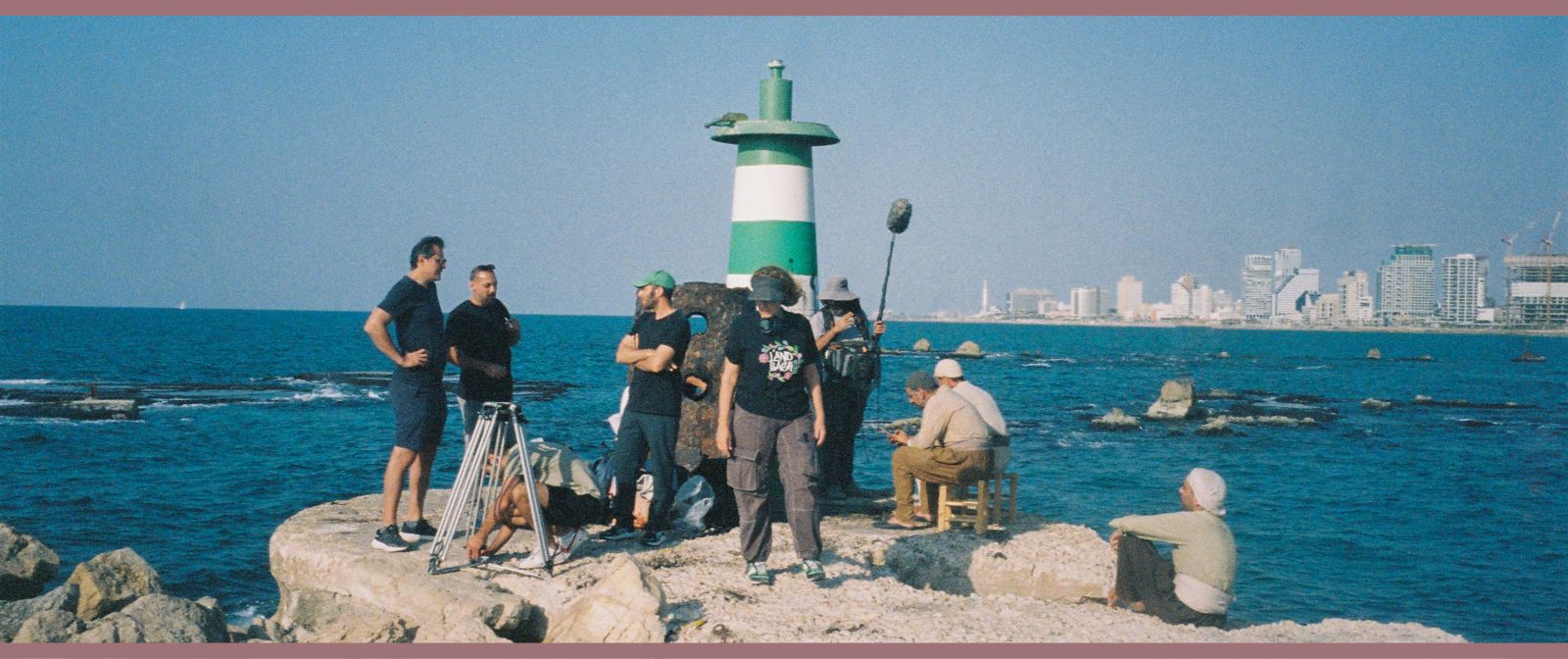
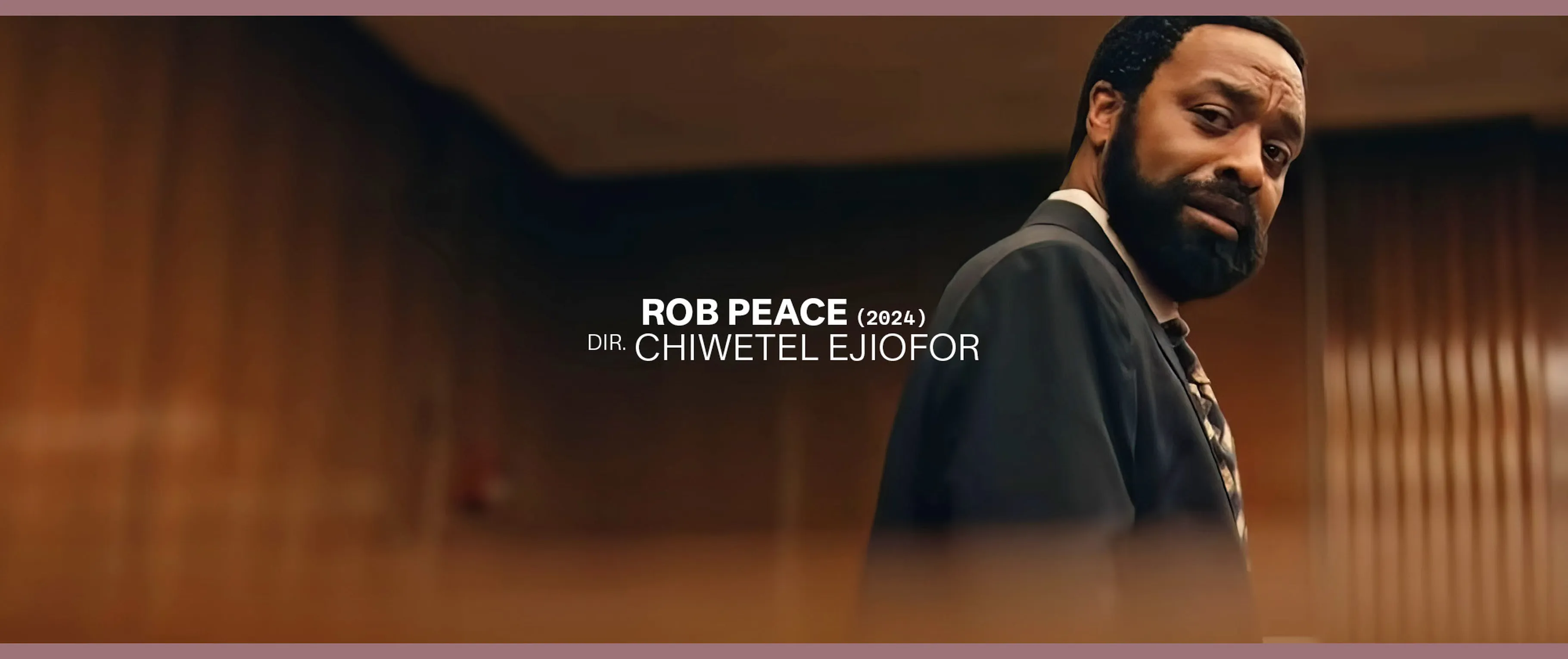
Annemarie on the set of Palestine 36 in Jaffa, October 2024
Did you immediately feel like you had found your calling?
When I got to graduate school I felt intimidated. Most of my classmates had prior directing experience, whereas I felt I had none. I started writing and collaborating with friends on films, and made a living as a news camerawoman, shooting wedding videos and as a museum researcher. But I guess that’s how my career started.
Your short film Like Twenty Impossibles was a turning point. The film tells the story of a film crew who run into trouble when they decide to take a remote road to avoid a checkpoint. As they drive into trouble, the film questions the motives behind artists and filmmakers. What do you recall about the making of this short?
It was my thesis film at Columbia. I originally focused on screenwriting but directing actors became my passion. I wanted to shoot in Palestine, but my professors hated the script—one even said I should burn it. I ignored them and filmed in Palestine. It was difficult—the second intifada was at its peak, and there was danger all around us. I went to shoot the film in 2001 and didn’t wrap until 2003. When I finally finished, I submitted it to Cannes, and to my shock it got in. Ironically, Columbia now shows it to incoming students.
You were in Ramallah during the second intifada, even though you could have stayed elsewhere. Why?
Because it’s home. I’ve lived in many places but Palestine is the only constant. It’s the only place I’ve ever gone back to. I’ve never been back to Riyadh or Texas or California or Scotland. I always came to Palestine with my family, and then at some point in my twenties I started to come alone. At one stage I was living with my grandparents and teaching English at Bethlehem University. I always felt like I was plugged into the community and had friends there. There were many filmmakers and artists insisting we tell our stories. It was a violent time. I remember hiding in the bathroom when we heard bombs being dropped, because it was the safest place in the house. When I shot Like Twenty Impossibles we based ourselves in the only hotel that was open in Jerusalem. There were two other directors there making films during the intifada, Elia Suleiman and Hany Abu-Assad. I am always aware of my own privilege—I have a foreign passport, so I can leave, unlike many others. Like even today, with what is happening in Palestine, we are not in Gaza. We’re still alive. Our home is still standing.
Your first feature, Salt of This Sea, begins with Soraya, an American-passport holder with Palestinian heritage, being questioned by skeptical border guards about the reason for her visit. I found it fascinating to revisit the scene, as it seems to encapsulate a central theme in your work, which revolves around the meaning of home.
Salt of This Sea isn’t autobiographical, but I knew many like Soraya—Palestinians raised abroad who dream of returning, only to feel like outsiders. They are able to visit because they have a foreign passport, and sometimes they may be the first family member in three generations to return, but they all know the history of their family and carry the trauma of being forced to leave. The film also contrasts her with Emad [Saleh Bakri], who desperately wants to leave Palestine. For him, in order to breathe, he has to get out of the place that she wants to belong to. Their experiences embody the contradictions of exile and home.
The film feels almost Coen brothers–esque when Soraya decides to rob a bank but only steal the exact amount that her family lost when they were forced to leave in 1948. How did that idea develop?
While living in Bethlehem, I heard about a real bank robbery. Israel had put the city under curfew and a trio of Palestinians, including a woman from Bethlehem, robbed a local bank in Palestine—right in the middle of the military curfew. It launched the whole city into a debate about whether they were criminals or not. Were they thieves? Were they justified in taking what was originally Palestinian money? The debate went on for weeks and that fascinated me.
I also knew an older man in Ramallah, a refugee from Jaffa, who once had a bank account before 1948. When he became a refugee in 1948, his account was frozen and he was blocked out. Years later, he saw his former British bank manager, and he demanded answers only to be ignored. He was humiliated and enraged. That stuck with me—how not just land but wealth, dignity and entire lives were stolen. The robbery in Salt of This Sea is rooted in those real stories.
“The Arab film industry is actually more balanced than the one in the West, where male directors dominate.”
Both Like Twenty Impossibles and Salt of This Sea made it to Cannes. What impact did that have on you?
Cannes was a game changer for me. I didn’t know much about the industry when I traveled to the south of France with Like Twenty Impossibles, but through the festival I met the French producers who later helped me make Salt of This Sea.
And were you aware at the time of the rise of Arab female filmmakers?
As for Arab female filmmakers, I was very aware—we have so many voices, especially Palestinian ones. I co-founded the Palestinian Filmmakers Collective and was involved in Dreams of a Nation [the largest traveling film festival in Palestine], curating and creating resources to showcase Arab cinema, which often goes unnoticed.
As you were rising to prominence in the 2010s Arab cinema was blossoming, with women at the forefront. What did that mean, considering regional stereotypes?
There’s a misconception about women in Arab cinema. My French producers worried about me directing Salt of This Sea in a male-dominated environment, but my Arab crew was incredibly respectful. The resistance came from a few European crew members who struggled to take me seriously as a first-time filmmaker. The Arab film industry is actually more balanced than the one in the West, where male directors dominate.
In When I Saw You, you focus on 1967, a defining year in the Arab-Israeli conflict. Why that moment?
The late ’60s were full of hope, liberation and anti-colonial movements. For my family, 1967 marked the loss of our part of Palestine—Bethlehem was occupied, and everything changed. I grew up constantly hearing “Before ’67, we used to…” The film captures both the loss and the spirit of resistance, told through the eyes of a child, Tarek, who doesn’t yet grasp the complexities of what is happening or the concept of borders, but who feels the injustice deeply. He can see Palestine but doesn’t understand why he can’t just walk there.
The film portrays the liberation movement in a poetic way, and this makes it feel romantic. Was that the intention, to make the resistance feel exalted?
Absolutely. It’s from Tarek’s perspective, a child’s point of view, and for him the fighters are symbols of hope, not just militants. So to him, they seem quite romantic. It’s not a bloody film, we don’t see battles or things like that; you see guys singing and dancing. I was inspired by archival footage from Palestinian film units, where fighters documented their daily lives—training, singing, reading letters—not just war. I was interested in how Palestinians were filming themselves. The Palestinians were themselves forming a liberation movement which they believed would take them home, and so the images they shot were full of hope. Those moments shaped the film’s aesthetic. There are even specific moments that are direct references to those archival films.
From left: A mural on the Apartheid Wall in Bethlehem; Annemarie in Haifa; Annemarie and crew on set in the hills of Jordan
Your aesthetic often involves close framing. What draws you to that?
I like flawed characters and intimate storytelling. Being close to them allows for nuance—their struggles, contradictions and emotions. Soraya (Salt of This Sea), Shadi (Wajib), and even Tarek (When I Saw You) aren’t always likable, but they’re real.
With Wajib, the father-son dynamic resonates beyond Palestine. Did your own experience influence that theme?
Yes. People who live between worlds constantly question where they belong. Shadi loves Palestine but sees its flaws because he wants more for it. His father fears losing him to a life abroad. That tension—between nostalgia, frustration and love—is something many of us experience. In the end, we create our own world between these spaces.
Religion appears in the background of your films but isn’t a central theme. Why is that?
Religion is part of any culture, but my main characters tend to be secular. I see religion as something personal and spiritual, so I approach it with respect. Some audiences, especially producers in France, were confused when Soraya prays in a mosque in Salt of This Sea. They questioned whether she was religious, because they hadn’t seen her pray before. But prayer can be an emotional response, not just a habit. She is moved to pray by being in a village that is destroyed. I don’t think this is a contradiction in her character. Being a Muslim is not something that is black-and-white, this other space exists. I find it frustrating that this is something so hard for European audiences to comprehend—they accept it for their own communities but for ours, they often expect rigid portrayals of faith.
You co-founded Philistine Films. What led to that decision?
It was out of necessity—there weren’t many outlets for independent Palestinian cinema. Early on, there was almost no Arab funding, so we relied on crowdfunding and European co-productions. If a filmmaker didn’t speak English or have connections, it was much harder to get a film made. We wanted to create a support system.
Has the company evolved since then?
Yes, my partner, Ossama, expanded it. We not only produce films but also provide production services. We push for international productions to use local crews instead of bringing in foreign teams.
![<I>Salt of This Sea</I>, dir. Annemarie Jacir, 2008]() Salt of This Sea, dir. Annemarie Jacir, 2008
Salt of This Sea, dir. Annemarie Jacir, 2008![<I>Wajib</I>, dir. Annemarie Jacir, 2017]() Wajib, dir. Annemarie Jacir, 2017
Wajib, dir. Annemarie Jacir, 2017![<I>Like Twenty Impossibles</I>, dir. Annemarie Jacir, 2003]() Like Twenty Impossibles, dir. Annemarie Jacir, 2003
Like Twenty Impossibles, dir. Annemarie Jacir, 2003![<I>When I Saw You</I>, dir. Annemarie Jacir, 2012]() When I Saw You, dir. Annemarie Jacir, 2012
When I Saw You, dir. Annemarie Jacir, 2012
You also collaborate with filmmakers across the Arab world, right?
Absolutely. Right now we’re co-producing Cotton Queen by Sudanese-Russian filmmaker Suzannah Mirghani, and we’ve worked with many others over the years. Arab filmmakers need to support each other—we all stand on the shoulders of those who came before us.
Can you tell us about the working space for artists you have established?
It’s in my grandfather’s house in Bethlehem. My sister and I transformed it into a residency and creative space for artists. It offers a place for experimentation, workshopping and even failure—without judgment. My sister is the director and manages the various components: sound, landscape residency, music, dance, research, et cetera. It is a woman-led initiative and over the years we have seen incredible, magical things happen there.
Can you reveal anything about your new film?
The film is titled Palestine 36 and is the biggest project of my life. It’s set in the 1930s, during the Palestinian farmer-led uprising against British colonial rule. This period is critical to understanding everything that has happened since. It has taken about eight years to bring this film together. It required extensive preparation, including restoring a village in the West Bank, planting crops, costumes and reconstructing period-accurate British tanks and weapons. It was an immense undertaking.
How did the recent conflict affect your process?
We were set to start filming on October 15, 2023, but after October 7 everything changed. The production was halted, the crew was evacuated, and some even arrested. The local crew struggled to get home. Our entire world came crashing down after 10 months of preproduction. It was not just the biggest undertaking I’ve ever been involved in but for all of us. We put our hearts into this. The film faced multiple stops and restarts over the next 15 months.
Where was the film eventually shot?
My producers pushed hard to move production abroad. Alternative locations were suggested. I received location pictures from Malta, Cyprus, Greece and Morocco. I insisted on our return to Palestine—that it had to be done there. But the situation became too dangerous, and no agents wanted to send their cast here, and no insurance would cover us. Eventually we filmed a part in Jordan. After a lot of stubbornness, I finally got to realize my dream of returning to Palestine. It was essential that this film, of all films, was made on our land. We finally completed filming there in November, with much of the original crew.
Who is in the cast?
It is the most incredible and beautiful cast. It’s a mix of British and Arab actors, including Jeremy Irons, newcomer Karim Daoud Anaya and Yafa Bakri, as well, and some of my regular collaborators, like Saleh Bakri. The cast includes both well-known and emerging talent.
Why focus on 1936 instead of 1948?
The 1936 revolt was a defining moment. For me, it is the most critical moment to understand what happened to us—and what would happen in 1948. You cannot understand ’48 without understanding what happened in ’36. It was the longest uprising against British rule, and had it succeeded the region could have taken a different path. The film follows a group of villagers forced to make life-changing decisions in the face of occupation. It challenges the idea that Palestine’s history is “complicated”—it’s a colonial story like many others worldwide.
